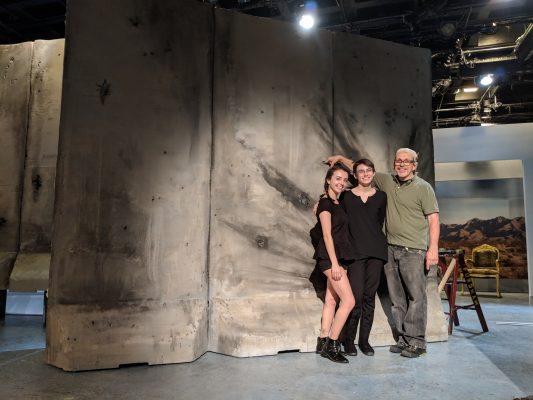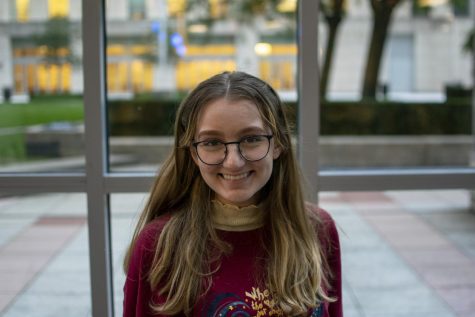Inside a Fordham Mainstage Production Rehearsal: Antigonick
“Antigonick” is the first show of Fordham Theatre’s mainstage season.
October 10, 2018
The room was still but for a moment. Crew members relaxed before getting to work, with tasks expected to last until late into the night. Players on and off stage tossed inside jokes around and laughed among themselves. Fordham College at Lincoln Center (FCLC) Stage Managers Chloe Morrell, FCLC ’19, and Nat DiMario, FCLC ’20, entered and gave brief introductions. Then, it was off to work.
The rehearsal in Franny’s Space was lit and set as the Pope Auditorium will be from Oct. 4-6 and from 10-12 for the first mainstage show this season, “Antigonick,” a provocative retelling of “Antigone” from Anne Carson’s fresh perspective. Places were taken; the cast scattered.
Over the course of the next hour, the cast and crew ran through the last few scenes of the play. In a 2018-19 season that ponders the question, “What happens when?” Carson’s translation, or rather reimagining, offers a fresh visual and textual experience for audiences and performers alike.
In the rehearsal, Antigone, performed by Brittani Murphy, FCLC ’21, plots to bury her fallen brother, Polyneikes. He is viewed as a traitor in the eyes of their tyrannical king, Kreon, who decreed that Polyneikes be shamed and forgotten. In the face of fierce authoritarian opposition, Antigone becomes the first protagonist this season to question the power of the patriarchy.
Murphy reflected deeply on the meaning of her character in a modern retelling. “I believe Antigone’s role is hope,” she said. “The thing that matters here, the love, the hope, the humanity is leaving. And it takes one act to spoil the whole land. So Antigone is the hope. She’s trying to bring it back. She’s doing it for her brother but really she’s doing it for the entire nation of Thebes.”
Even as she conceded that Kreon’s actions may technically be in the interest of justice, she said: “There’s hypocrisy within Antigone. I mean there’s hypocrisy within anyone, especially when you take an extreme stance … But it’s also who’s making the laws. And is the law of man bigger than the law of the Gods and the law of humanity?”
During a quick break, Morrell and DiMario spoke on the rehearsal process as a whole. Morrell appreciated the universal and transcendent currency of Carson’s text, explaining, “This translation is contemporary. I think it’s important now … to show how defiance of authority sometimes on what you know is humanly right is important to remember. Regardless of the fear that it can cause.”
DiMario was struck by the retelling’s inclusion of Nick, a silent but always visible character typically seen measuring things on the stage. “I think he shows an under-layer, he physically represents the underrepresented characters,” they explained. “For me, I think [his presence] is the pivotal moment.”
“Just kind of giving a physical representation to the people who we don’t hear and being able to connect people and bring people from these two different worlds together, that’s really his place in the play,” DiMario added.
The scene drew to a close; the Chorus implored the last words — wisdom. “Better get some,” they echoed, “even too late.”
Perhaps it is now more than ever in this intemperate political landscape that audiences need to hear such provocative terms. But for this cast and crew at that moment, there is more tinkering to be done before audiences are ready for this hard-hitting material.














